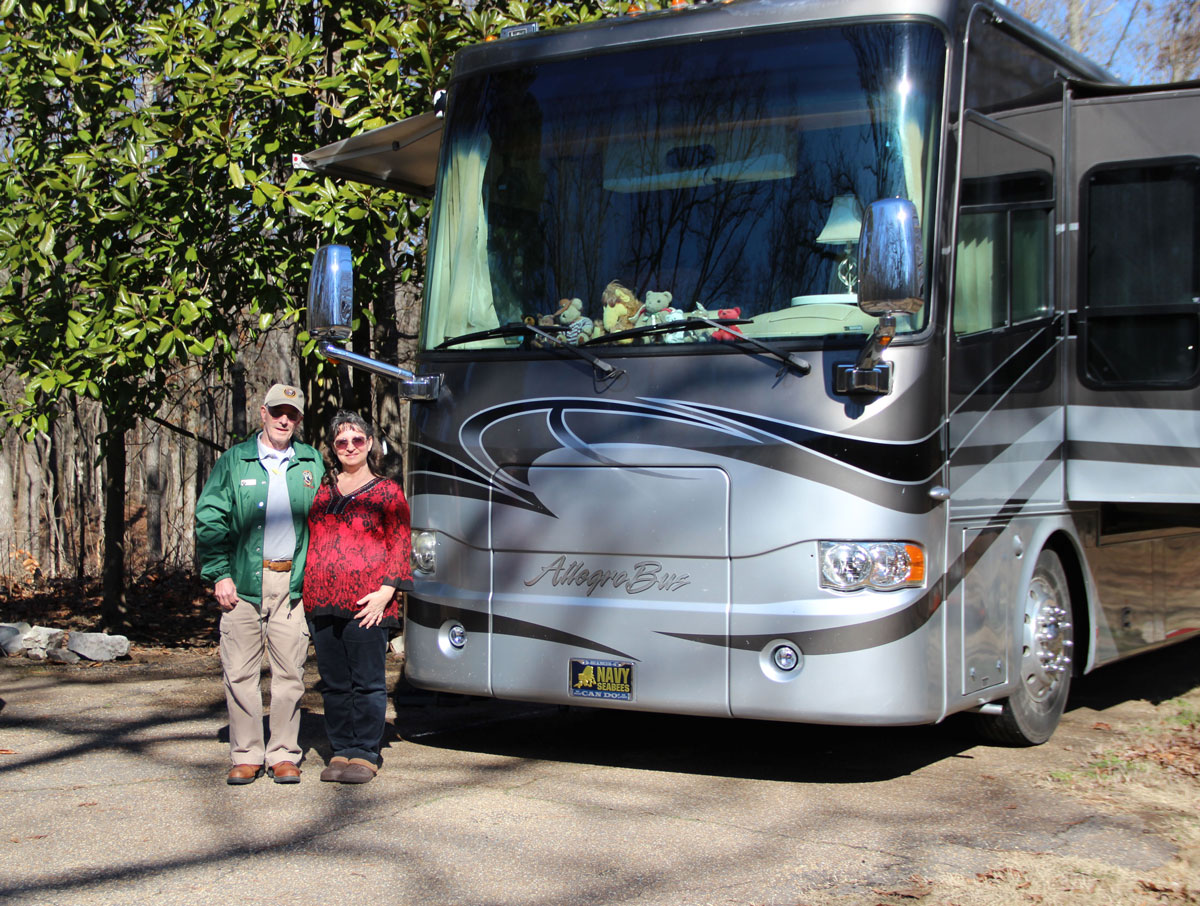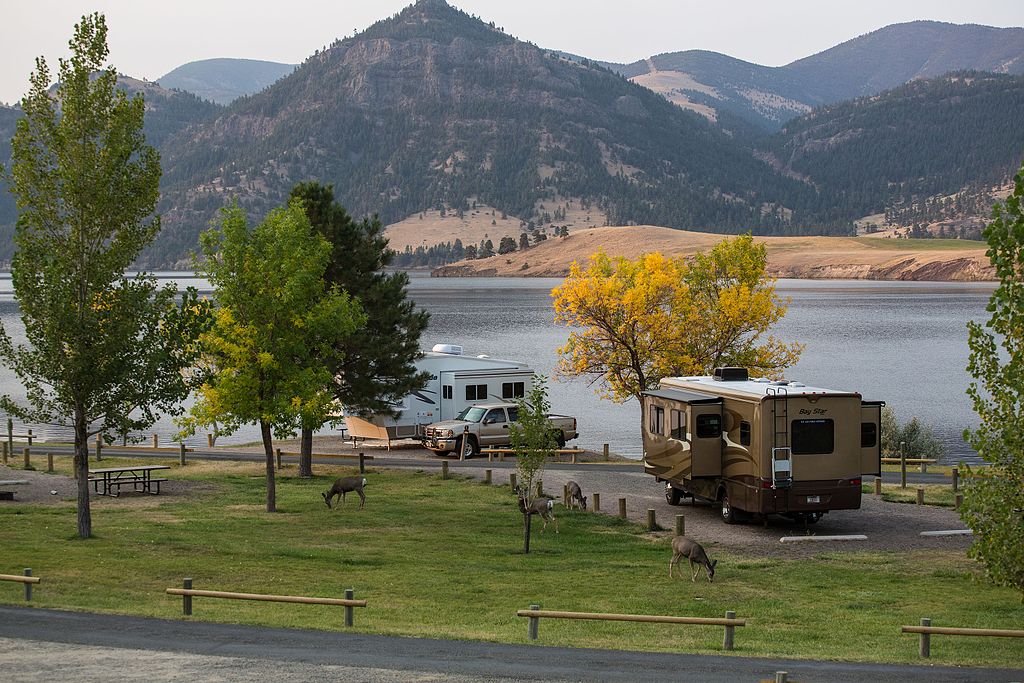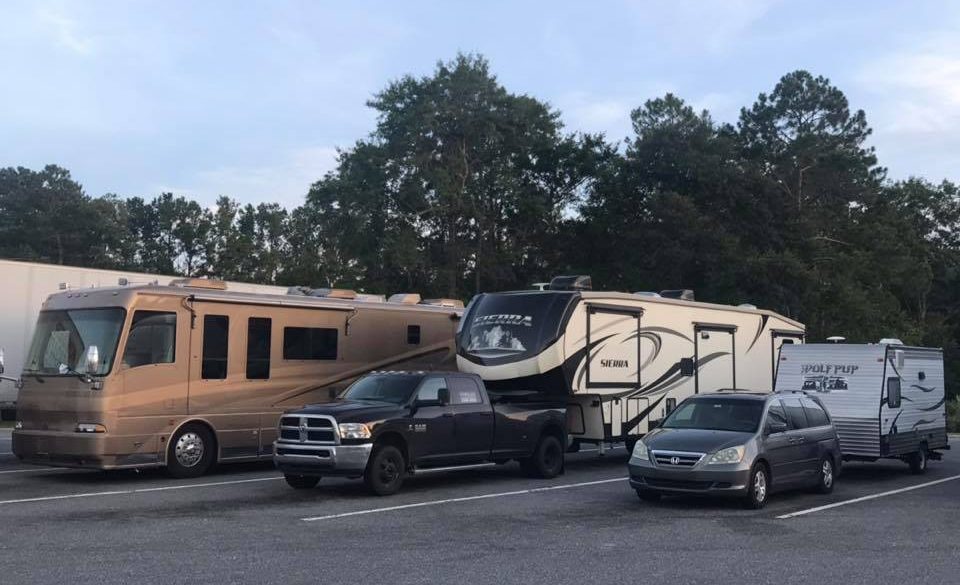Is it better to drive a motorhome RV, or to tow a travel trailer that hitches to your existing vehicle? It’s a very important question for anyone looking to become an RVer and travel to various campgrounds and camping trips.
For most people, a travel trailer will be a better option. Unless if you plan to stay in one location with a large Class A bus style motorhome, or want the mobility of a shorter campervan, the ability to have a separate camper allows you to save on money, headaches, and maintenance.
Here are a few of the pros and cons and things to consider with an RV vs. travel trailer:
When to Go for a Large Motorhome Class A RV

For the retirement age folks and older crowd out there, there’s a lot of them that only drive to one location. This may be an RV park or campground, and once they get there, they tend to stay and don’t leave the RV park for a long period of time.
In this case, a large motorhome makes sense since you won’t be moving around too much. You can take advantage of the luxurious cabin and not need to worry as much about the length of your RV since it’ll be more like your home on wheels that’s parked in one spot.
Once You’re at a Location, What Do You Do With Your Rig?

Many people have the idea that they’re going to get a full-on RV with a vehicle and home all in one piece. What happens when you need to go get groceries? What if you want to get a pizza? Or to go hiking?
If your vehicle is a bus, you have to take the entire thing with you wherever you go. Not to mention that once you get to an RV park or campground, you hook everything up.
This includes connecting the water and sewer hoses, hooking up electrical wires, and doing your leveling job. This is about a 15 to 30-minute set-up or tear-down each time. That means it’s a lot more work every time you want to go somewhere, and something you really don’t want to do constantly.
Funny enough, most people that have full-on RVs will end up towing a tiny vehicle behind it for this exact reason.
Generally, Travel Trailers Do Not Break Down
There’s typically not something too complicated that breaks on a travel trailer.
Your tow vehicle is a normal vehicle that you can take anywhere to get serviced and worked on.
This is not the case with a $300,000 motorhome that needs to get repaired at a specialized place. Many times they’re diesel engines and specialized vehicles.
Getting it repaired is going to cost a lot more and be more difficult to find a place to get it serviced.
RVs Do Not Have to Be Unhitched
This is a major benefit to driving a motorhome RV. If you’re an old-timer and you pull into a campsite, you connect all the hoses and wires and use the self-leveling functions, there’s not much else to do.
Whereas with a travel trailer, you have to back it in, unhitch it, and there’s a bit of work to it. If you’re 70 or 80 years old, then it makes sense to not put yourself through such strenuous labor.
You Can Use Your Tow Vehicle When You’re Not RVing
With a travel trailer, you spend however much on your tow vehicle. Let’s say about $45,000 for an average truck and then about $30,000 on a large travel trailer. This adds up to about $75,000 all in.
When you’re doing your usual day-to-day stuff, you still have a truck or tow vehicle to use as a regular mode of transportation. Then, the travel trailer just goes to the storage park or sits on your property.
With an RV, the least expensive ones will be about $100,000. However, it’s sole purpose is as an RV.
It’s less expensive to have a travel trailer and a tow vehicle, and you have something that you can use when you’re not traveling.
RVs Are Easier to Drive
With one large unit, they’re easier to drive since you don’t have to worry about sway and towing. No hitching up, all you have to do is hop in the driver’s seat and you’re off to your next destination.
There’s More of a Range of Travel Trailers to Choose From
With travel trailers, you have more of a range of sizes to choose from. For the most part, driving RVs have a few set sizes and lengths for a Class A, Class B, and Class C, without too much in between.
In comparison, you can go from extremely large and long travel trailers, all the way down to the small sizes that you can tow with a minivan. These price ranges go from $5,000 to $10,000 for tiny travel trailers, and all the way up to $30,000 or $65,000 massive 40-foot trailers with double slides.
Go for a Conversion Van or Class B RV for Something in Between

With the popularity of van life, conversion vans and different variations of Class B RVs have come to the forefront of the RV world. Campers and aspiring travelers can take advantage of the smaller size, common and easy to work on engine chassis, and that your home and RV are all in one.
Typically a campervan will cost more than the average travel trailer. On the other hand, you don’t have the cost of a tow vehicle if you don’t already own a capable one.
Conclusion
The main thing to keep in mind between an RV vs travel trailer is that you don’t get away from two vehicles. A lot of people think to get the RV and then they’ll have the vehicle and the living in one unit.
In the real world, that only works if you’re older and plan on going to specific places. If you’re not going to go anywhere once you’ve gotten to where you’re going, then an RV may make sense. Otherwise, travel trailers are the way to go.

